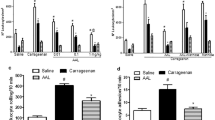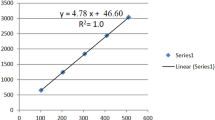Abstract
Aims and methods
Minocycline (Mino) and doxycycline (Dox) are second generation tetracyclines known to present several other effects, which are independent from their antimicrobial activities. We studied in a comparative way the anti-inflammatory effects of Mino and Dox, on acute models of peripheral inflammation in rodents (formalin test and peritonitis in mice, and carrageenan-induced paw oedema in rats). Immunohistochemical assays for TNF-alpha and iNOS in rat paws of carrageenan-induced oedema were also carried out as well as in vitro assays for myeloperoxidase (MPO) and lactate dehydrogenase (LDH). Furthermore, antioxidant activities were evaluated by the DPPH assay.
Results
In the formalin test although Mino and Dox (1, 5, 10 and 25 mg/kg, i.p.) inhibited the first phase, they acted predominantly on the second phase of the test, where inhibition of the licking time close to 80% were observed. Mino and Dox were very efficacious in reducing the carrageenan-induced paw oedema in rats (10, 25 and 50 mg/kg, i.p.) and carrageenan-induced leucocyte migration (1 and 5 mg/kg, i.p.) to mice peritoneal cavities. Besides, they also significantly inhibited MPO and LDH releases at doses ranging from 0.001 to 1 μg/ml. Thus, in general, the anti-inflammatory activity of Dox was higher as compared to that of Mino, although the radical scavenging activity of Mino was of a magnitude 10 times higher.
Conclusions
Our data indicate that anti-inflammatory and antioxidant effects, involve the inhibition of iNOS and TNF-alpha, among other properties, and these encourage clinical studies of these compounds for new therapeutic applications, especially those were inflammation plays a role.








Similar content being viewed by others
References
Aladakatti SV, Patil PA, Vivek V (2008) Influence of tetracyclines on inflammation and their interaction with aspirin in male Wistar rats. Pharmacology online 3:808–819
Alano CC, Kauppinen TM, Valls AV, Swanson RA (2006) Minocycline inhibits poly (ADP-ribose) polymerase-1 at nanomolar concentrations. Proc Natl Acad Sci USA 103:9685–9690
Amin AR, Attur MG, Thakker GD, Patel PD, Vyas PR, Patel RN, Patel IR, Abramson SB (1996) A novel mechanism of action of tetracyclines: effects on nitric oxide synthases. Proc Natl Acad Sci USA 93:14014–14019
Arvin KL, Han BH, Du Y, Lin SZ, Paul SM, Holtzman DM (2002) Minocycline markedly protects the neonatal brain against hypoxic-ischemic injury. Ann Neurol 52:54–61
Attur MG, Patel RN, Patel PD, Abramson SB, Amin AR (1999) Tetracycline up-regulates COX-2 expression and prostaglandin E2 production independent of its effect on nitric oxide. J Immunol 162:3160–3167
Bastos LF, Merlo LA, Rocha LT, Coelho MM (2007) Characterization of the antinociceptive and anti-inflammatory activities of doxycycline and minocycline in different experimental models. Eur J Pharmacol 576:171–179
Bombardier S, Cattani P, Giabattoni G, Di Munno O, Paero G, Patrono C, Pinca E, Pugliese F (1981) The synovial prostaglandin system in chronic inflammatory arthritis: differential effects of steroidal and non-steroidal antiinfammatory drugs. Br J Pharmacol 73:893–901
Cai ZY, Yan Y, Sun SQ, Zhang J, Huang LG, Yan NN, Wu F, Li JY (2008) Minocycline attenuates cognitive impairment and restrains oxidative stress in the hippocampus of rats with chronic cerebral hypoperfusion. Neurosci Bull 24:305–313
Cazalis J, Tanabe S, Gagnon G, Sorsa T, Grenier D (2009) Tetracyclines and chemically modified tetracycline-3 (CMT-3) modulate cytokine secretion by lipopolysaccharide-stimulated whole blood. Inflammation 32:130–137
Chen M, Ona VO, Li M, Ferrante RJ, Fink KB, Zhu S, Biau J, Gno L, Farrell LA, Hersch SM, Hobbs W, Vonsattel JP, Cha JH, Friedlander RM (2000) Minocycline inhibits caspase-1 and caspase-3 expression and delays mortality in a transgenic mouse model of Huntington disease. Nat Med 6:797–801
Cho IH, Chung YM, Park CK, Li HY, Kim D, Plao ZH, Choi SY, Lee SJ, Park K, Kim JS, Jung SJ, Oh SB (2006) Systemic administration of minocycline inhibits formalin-induced inflammatory pain in rat. Brain Res 1072:208–214
Daher JB, Tonussi CR (2003) A spinal mechanism for the peripheral anti-inflammatory action of indomethacin. Brain Res 962:207–212
Davies P, MacIntyre DE (1992) Prostaglandins and inflammation. In: Gallin JI, Goldstein IM, Snyderman R (eds) Inflammation: basic principles and clinical correlates. Raven Press, New York, pp 123–138
Davies P, Bailey PJ, Goldenberg MM, Ford-Hutchinson AW (1984) The role of arachidonic acid oxygenation products in pain and inflammation. Ann Rev Immunol 2:235–257
De Young LM, Kheifets JB, Ballaron SJ, Young JM (1989) Edema and cell infiltration in the phorbol ester-treated mouse ear are temporally separate and can be differentially modulated by pharmacologic agents. Agents Actions 26:335–341
DeClerk YA, Shimada H, Taylor SM, Langley KE (1994) Matrix metalloproteinases and their inhibitors in tumor progression. Ann NY Acad Sci 732:222–232
El Kebir D, József L, Pan W, Filep JG (2008) Myeloperoxidase delays neutrophil apoptosis through CD11b/CD18 integrins and prolongs inflammation. Circ Res 103:352–359
Faith M, Sukumaran A, Pulimood AB, Jacob M (2008) How reliable an indicator of inflammation is myeloperoxidase activity? Clin Chim Acta 396:23–25
Foster SJ, McCormick ME, Howarth A, Aked D (1986) Leukocyte recruitment in the subcutaneous sponge implant model of acute inflammation in the rat is not mediated by leukotriene B1. Biochem Pharmacol 35:1709–1717
Fu KY, Light AR, Maixner W (2000) Relationship between nociceptor activity, peripheral edema, spinal microglial activation and long-term hyperalgesia induced by formalin. Neuroscience 101:1127–1135
Gilbertson-Beadling S, Powers EA, Stamp-Cole M, Scott PS, Wallace TL, Copeland J, Petzold G, Mitchell M, Ledbetter S, Poorman R (1995) The tetracycline analogs minocycline and doxycycline inhibit angiogenesis in vitro by a non-metalloproteinase-dependent mechanism. Cancer Chemother Pharmacol 36:418–424
Giuliani F, Hader W, Yong VW (2005) Minocycline attenuates T cell and microglia activity to impair cytokine production in T cell-microglia interaction. J Leukoc Biol 78:135–143
Greenwald RA (1994) Treatment of destructive arthritic disorders with MMP inhibitors. Potential role of tetracyclines. Ann N Y Acad Sci 732:181–198
Guay J, Bateman K, Gordon R, Mancini J, Riendeau D (2004) Carrageenan-induced paw edema in rat elicits a predominant prostaglandin E2 (PGE2) response in the central nervous system associated with the induction of microsomal PGE2 synthase-1. J Biol Chem 279:24866–24872
Henry CJ, Huang Y, Wynne A, Hanke M, Himler J, Bailey MT, Sheridan JF, Godbout JP (2008) Minocycline attenuates lipopolysaccharide (LPS)-induced neuroinflammation, sickness behavior and anhedonia. J Neuroinflamm 13:5–15
Hsu SM, Raine L (1981) Protein a, avidin, and biotin in immunohistochemistry. J Histochem Cytochem 29:1349–1353
Hua XY, Svensson CI, Matsui T, Fitzsimmons B, Yaksh TL, Webb M (2005) Intrathecal minocycline attenuates peripheral inflammation-induced hyperalgesia by inhibiting p38 MAPK in spinal microglia. Eur J Neurosci 22:2431–2440
Hunskaar S, Fasmer OB, Hole K (1985) Formalin test in mice, a useful technique for evaluating mild analgesics. J Neurosci Methods 14:69–75
Ichitani Y, Shi T, Haeggstrom JZ, Samuelsson B, Hökfelt T (1997) Increased levels of cyclooxygenase-2 mRNA in the rat spinal cord after peripheral inflammation: an in situ hybridization study. Neuroreport 8:2949–2952
Kelly KJ, Sutton TA, Weathered N, Ray N, Caldwell EJ, Plotkin Z, Dagher PC (2004) Minocycline inhibits apoptosis and inflammation in a rat model of ischemic renal injury. Am J Physiol Renal Physiol 287:F760–F766
Kraus RL, Pasieczny R, Lariosa-Willingham K, Turner MS, Jiang A, Trauger JW (2005) Antioxidant properties of minocycline: neuroprotection in an oxidative stress and direct radical-scavenging activity. J Neurochem 94:819–827
Ledeboer A, Sloane EM, Milligan ED, Frank MG, Mahony JH, Maler SF, Watkins LR (2005) Minocycline attenuates mechanical allodynia and proinflammatory cytokine expression in rat models of pain facilitation. Pain 115:71–83
Leppert D, Lindberg RL, Kappos L, Leib SL (2001) Matrix metalloproteinases: multifunctional effectors of inflammation in multiple sclerosis and bacterial meningitis. Brain Res. Brain Res. Rev 36:249–257
Libby P (2007) Inflammatory mechanisms: the molecular basis of inflammation and disease. Nutr Rev 65:S140–S146
Lucisano YM, Mantovani B (1984) Lysosomal enzyme release from polymorphonuclear leukocytes induced by immune complexes of IgM and of IgG. J Immunol 132(4):2015–2020
Nieman GF, Zerler BR (2001) A role for the anti-inflammatory properties of tetracyclines in the prevention of acute lung injury. Curr Med Chem 8:317–325
Omote K, Hozama K, Kawamata T, Kawamata M, Nakayaka Y, Toriyabe M, Namiki A (2001) Peripheral nitric oxide in carraggenan-induced inflammation. Brain Res 912:171–175
Padi SS, Kulkarni SK (2008) Minocycline prevents the development of neurophatic pain, but not acute pain: possible anti-inflammatory and amtioxidant mechanisms. Eur J Pharmacol 601:79–87
Ramamurthy NS, Greenwald RA, Moak SA, Scuibba J, Goren A, Turner G, Rifkin B, Golub LM, Riazi K, Galic MA, Kuzmiski JB, Ho W, Sharkey KA, Pittman QJ (2008) Microglial activation and TNF-alpha production mediate altered CNS excitability following peripheral inflammation. PNAS 105:17151–17156
Riazi K, Galic MA, Kuzmiski JB, Ho W, Sharkey KA, Pittman QJ (2008) Microglial activation and TNF-alpha production mediate altered CNS excitability following peripheral inflammation. Proc Natl Acad Sci USA 105:15151–17156
Rifkin B, Vermillo AT, Golub LM (1993) Blocking periodontal disease progression by inhibiting tissue-destructive enzymes: a potential therapeutic role for tetracyclines and their chemically-modified analogs. J Periodontol 64:819–827
Saint-Cricq de Gaulejac NS, Provost C, Vivas N (1999) Comparative study of polyphenol scavenging activities assessed by different methods. J Agric Food Chem 47:425–431
Samad TA, Moore KA, Sapirstein A, Billet S, Allchorne A, Poole S, Bonventre JV, Woolf CJ (2001) Interleukin-1 beta-mediated induction of Cox-2 in the CNS contributes to inflammatory pain hypersensitivity. Nature 410:471–475
Sweitzer SM, Colbum RW, Rutkowski M, DeLeo JA (1999) Acute peripheral inflammation induces moderate glial activation and spinal IL-1beta expression that correlates with pain behavior in the rat. Brain Res 829:209–221
Tjolsen A, Berge O-G, Hunskaar S et al (1992) The formalin test: an evaluation of the method. Pain 51:5–17
Uitto VJ, Firth JD, Nip L, Golub LM (1994) Doxycycline and chemically modified tetracyclines inhibit gelatinase A (MMP-2) gene expression in human skin keratinocytes. Ann NY Acad Sci 732:140–151
Villarreal FJ, Griffin M, Omens J, Dillmann W, Nguyen J, Covell J (2003) Early short-term treatment with doxycycline modulates postinfarction left ventricular remodelling. Circulation 108:1487–1492
Wang AL, Yu AC, Lau LT, Lee C, Wu IM, Zhu X, Tso MO (2005) Minocycline inhibits LPS-induced retinal microglia activation. Neurochem Int 47:152–158
Winter CA, Risley EA, Nuss GW (1962) Carrageenen-induced oedema in hind paw of rat: an assay for anti-inflammatory drugs. Proc Soc Exp Biol Med 111:544–547
Xiao QG, Liu ZG, Zhang M, Zheng JL, Zhang ZH, Chen JQ (2005) Effect of doxycycline on inflammation-related cytokines and apoptosis in human conjunctival epthelial cells. Zhonghua Yan Ke Za Zhi 41:842–846
Zhang ZY, Zhang Z, Fauser U, Schluesener HJ (2009) Improved outcome of EAN, an animal model of GBS, through amelioration of peripheral and central inflammation by minocycline. J Cell Mol Med 13:341–351
Zhu S, Stavrosvskaya IG, Drozda M, Kim BY, Ona V, Li M, Sarang S, Liu AS, Hartley DM, Wu du C, Gullans S, Ferrante RJ, Przedborski S, Kristal BS, Friedlander RM (2002) Minocycline inhibits cytochrome c release and delays progression of amyotrophic lateral sclerosis in mice. Nature 417:74–78
Acknowledgments
The authors are grateful to the Brazilian National Research Council (CNPq) for the financial support, to the technical assistance of Ivna Ângela Fernandes and Xênia Maria S. Serra, and to Professor M. O. L. Viana for the manuscript orthographic revision.
Author information
Authors and Affiliations
Corresponding author
Rights and permissions
About this article
Cite this article
Leite, L.M., Carvalho, A.G.G., Tavares Ferreira, P.L.F. et al. Anti-inflammatory properties of Doxycycline and Minocycline in experimental models: an in vivo and in vitro comparative study. Inflammopharmacol 19, 99–110 (2011). https://doi.org/10.1007/s10787-011-0077-5
Received:
Accepted:
Published:
Issue Date:
DOI: https://doi.org/10.1007/s10787-011-0077-5




